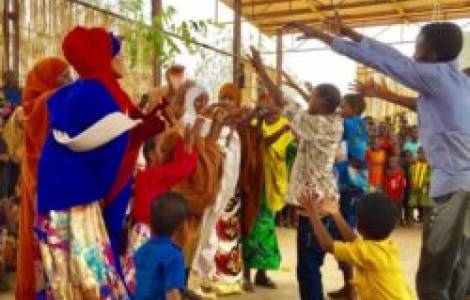
Jesuit Refugee Service
Adjumani (Agenzia Fides) - In Adjumani, in northern Uganda, the Jesuit father Lasantha Deabrew coordinates the Jesuit Refugee Service project for South Sudanese hosted in the refugee camps of Maaji and Aiylo. From this location, the priest was able to record “live” the feelings and hopes kindled among South Sudanese refugees by the recent apostolic visit of Pope Francis to South Sudan. "Some of them, Fr. Lasantha told Agenzia Fides, wanted to return to South Sudan precisely to participate in the event in person. They wanted to be present on such a special occasion. Many people in the camps have placed a great deal of confidence in the possible positive effects of the Pope's trip and in the words he spoke, as well as in the fact that the Pontiff wanted to visit the country together with the Archbishop of Canterbury and the Moderator of the Church of Scotland. Hopes are high, although at the same time many fear that the incapacity of political leaders and their interests could once again jeoparize everything".
Northern Uganda has 19 refugee camps, almost all inhabited by South Sudanese. "In all, reports Father Lasantha, the people housed in the Adjumani region number 280,000, all Christians, most of them Catholics. With five other priests, we take care of pastoral work: celebration of Mass and sacraments, formation of catechists. We try to support everyone spiritually, especially young people. Young people who go to school (there are school buildings in all the camps, ed) need to be supported, not only in their education, but also with a spiritual motivation".
In the refugee camps in the district of Adjumani, the Jesuit Refugee Service is also working with a project funded by AICS, the Italian Development Cooperation Agency. This is an emergency initiative to promote the integration of displaced, returnee and refugee populations by establishing community centers for youth and women and the construction of new water supply systems, support for breeding and trade. “We are involved in programs of social and psychological support, orientation and vocational training. The intervention, explains the Jesuit, aims to involve the refugee communities as well as the local communities, in order to promote integration and peaceful coexistence".
Until fifteen years ago, Uganda experienced terrible phases of conflict in various parts of its territory, which led to the death of thousands of people, the flight of more than a million and the spread of the terribble phenomenon of 'child soldiers'. Today, the country lives in relative peace and, although plagued by difficulties and critical problems, it stands out as the most open African country to welcoming refugees. Originally from South Sudan, Congo and Somalia, refugees in Uganda currently number 1.6 million. The government of Kampala, with the help of UNHCR and many donor agencies and NGOs, allows the entry of refugees and allocates them, after a process of identifying and understanding their needs, a plot of land in the fields and the possibility of building a house. "Of course, recognizes the Jesuit priest, there are many areas that would require substantial intervention to improve the conditions in the refugee camps, starting with the services for the education of the youngest and for the distribution of food (recently , there has been a contraction in aid due in large part to the Ukrainian crisis and the shortage of cereals, ed.). But overall, Uganda is a hospitable country, which offers many people the possibility of rebuilding their existence. (LA) (Agenzia Fides, 18/2/2023)